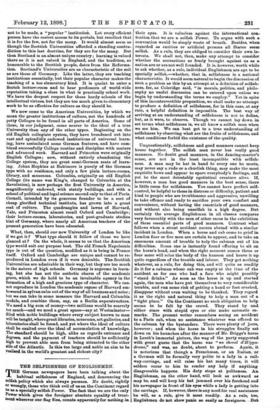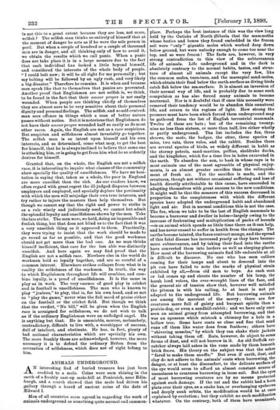THE SELFISHNESS OF ENGLISHMEN. German newspapers have been talking about
the L habitual selfishness of England, and denouncing the selfish policy which she always pursues. No doubt, rightly or wrongly, those who think evil of us on the Continent regard us as a specially selfish Power. The fact that we are the only Power which gives the foreigner absolute equality of treat- ment wherever our flag flies, counts apparently for nothing in
their eyes. It is valueless against the international con- tention that we are a selfish Power. To argue with such a convention would be simply waste of breath. Besides, when regarded as entities or artificial persons all States seem selfish. As a rule, they are obliged to consider their own in- terests. We shall not, then, make any attempt to consider whether the accusations so freely brought against us as a nation are or are not well founded. It is, however, worth while to ask whether, as a rule, individual Englishmen are apt to be specially selfish,—whether, that is, selfishness is a national characteristic. It would seem natural to begin the discussion of such a problem as this by an attempt at a definition of selfish- ness, for, as Coleridge said, "in morals, politics, and philo- sophy no useful discussion can be entered upon unless we begin by understanding the terms we employ." Yet in spite of this incontrovertible proposition, we shall make no attempt to produce a definition of selfishness, for in this case, at any rate, a helpful definition is impossible. The beat way of arriving at an understanding of selfishness is not to define, but, as it were, to observe. Though we cannot lay down in set terms what selfishness is, we all know a selfish man when we see him. We can beat get to a true understanding of selfishness by observing what are the fruits of selfishness, and what conditions forbid the existence of the quality.
Unquestionably, selfishness and good manners cannot keep house together. The selfish man never has really good manners. No doubt good manners, in the dancing-master's sense, are not in the least incompatible with selfish- ness. A man may be hat in hand to every one he meets, may never say a rude or a churlish thing, may make the most exquisite bows and appear to spare everybody's feelings, and yet be the most detestably egotistical creature alive. If, however, a man has good manners in the best sense, there is little room for selfishness. You cannot have perfect self- control, be helpful to those in distress or difficulty, patient and kind to people who are troublesome and aggressive, unwilling to take offence and ready to sacrifice your own comfort and convenience, without having the essentials of good manners, and without also being unselfish in a high degree. But certainly the average Englishman in all classes compares very favourably with the men of other races in the exhibition of these essential parts of good manners. Contrast what follows when a street accident occurs abroad with a similar incident in London. When a horse and cab come to grief in London four or five men are certain to appear, and to take an enormous amount of trouble to help the cabman out of his- difficulties. Some one is instantly found offering to sit on the horse's head, and when the right moment comes three or four more will seize the body of the hansom and heave it up quite regardless of the trouble and labour. They get nothing whatever, as a rule, for doing this, and will quite as readily do it for a cabman whose cab was empty at the time of the accident as for one who had a fare who might possibly " stand drinks." As soon as the horse is up and started again, the men who have put themselves to very considerable trouble, and run some risk of getting a hand or foot crushed, disappear without even waiting to be thanked. They regard it as the right and natural thing to help a man out of a "tight place." On the Continent no such obligation to help seems to be felt by the crowd. They stand by and either stare with stupid eyes or else make sarcastic re- marks. The present writer remembers seeing an accident to a Paris cab, when no assistance whatever was offered to the cabman by the bystanders. There were plenty of jeers, however; and when the horse in his struggles finally sat down on his haunches after the manner of Mr. Briggs's horse in Leech's immortal picture, the wag of the party suggested with great gusto that the horse was " un Anal d'Hippo- drome," and was, no doubt, about to perform. Again, it is notorious that though a Frenchman, or an Italian, or a German will be formally very polite to a lady in a rail- way-carriage, and will raise his hat many times, it will seldom occur to him to render any help if anything disagreeable happens. His duty stops at politeness. An Englishman, on the other hand, will look as awkward as may be, and will keep his hat jammed over his forehead and his newspaper in front of his eyes while a lady is getting into the carriage. If, however, there is any need for real assistance he will, as a rule, give it most readily. As a rale, too, Englishmen do not show panic so easily as foreigners. Bat is not this to a great extent because they are less, not more, selfish ? The selfish man thinks so entirely of himself that at the moment of danger he acts as if he were the sole person in peril. But when a couple of hundred or a couple of thousand men are in danger, and all thinking only of how to avoid it, we obtain the results which we call panic. When a panic does not take place it is in a large measure due to the fact that each individual has looked a little beyond himself, and considered the interests of the whole body of people. " I could bolt now ; it will be all right for me personally ; but my bolting will be followed by an ugly rush, and very likely a big disaster." Therefore he remains. It is when and because men speak like that to themselves that panics are prevented. Another proof that Englishmen are not selfish is, we think, to be found in the fact that their amour propre is not easily wounded. When people are thinking chiefly of themselves they are almost sure to be very sensitive about their personal dignity and personal feelings. The selfish, and so self-centred, man sees offence in things which a man of better nature passes without notice. But it is notorious that Englishmen do not have their amour propre wounded half so easily as do most
other races. Again, the English are not as a race suspicious. But suspicion and selfishness almost invariably go together.
The selfish man is so intent upon himself and his own • interests, and so determined, come what may, to get the best Tor himself, that he is always inclined to believe that some one is attacking him, or is going to get from him what he so ardently desires for himself.
Granted that, on the whole, the English are not a selfish race, it is interesting to inquire what classes of the community ehow specially the quality of unselfishness. We have no hesi- tation in saying that, taken as a whole, the poor in England are more unselfish than the rich. As our readers know, ws often regard with great regret the ill-judged disputes between employers and employed, and specially deplore the pertinacity with which the men will misjudge their own true interests, and try rather to injure the masters than help themselves. Bat though we cannot say that the right and power to strike is as a rule wisely and judiciously used, we cannot but admit the splendid loyalty and unselfishness shown by the men. Take the late strike. The men were, we hold, doing an impossible and foolish thing, but that does not blind us to the fact that it was a very unselfish thing as it appeared to them. Practically, they were trying to insist that the work should be made to go round as far as possible, and that the good workman should not get more than the bad one. As no man thinks himself inefficient, that care for the less able was distinctly unselfish. And here again we may find proof that the English are not a selfish race. Nowhere else in the world do workmen hold so loyally together, and are so careful of a common interest. Elsewhere strikes collapse from what is in reality the selfishness of the workmen. In truth, the way • in which Englishmen throughout life will combine, and com- bine loyally, is a proof of unselfishness. It is the same in play as in work. The very essence of good play in cricket and in football is unselfishness. The man who is known to play "jealous," to play, that is, for his own hand, and so not to "play the game," never wins the full weed of praise either on the football or the cricket field. But though we think that the verdict, "No bill," will be given when the English race is arraigned for selfishness, we do not wish to talk as if the ordinary Englishman were an unfledged angel. He is anything but that. He is nnamiable, morose, melancholy, contradictory, difficult to live with, a worshipper of success, dull of intellect, and obstinate. He has, in fact, plenty of bad national characteristics which are specially his own.
The more frankly these are acknowledged, however, the more necessary it is to defend the ordinary Briton from the accusation of selfishness, which does not of right belong to







































 Previous page
Previous page